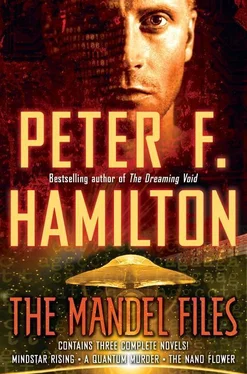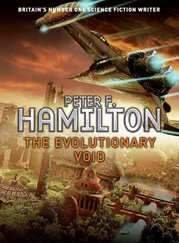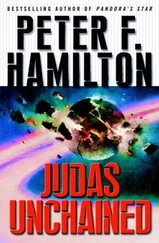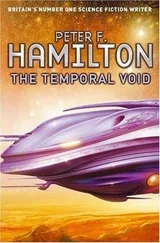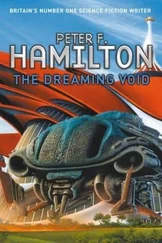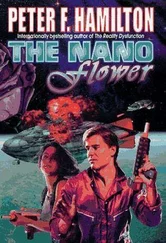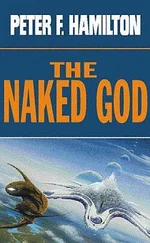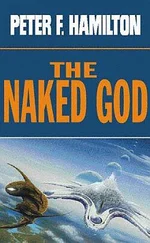But this touch of uncertainty was different, there was no intimation of physical danger. He knew that feeling, clear and strong, experiencing it time and again in Turkey.
He hesitated, getting an enquiring glance from Sean Francis.
“We’ve only had eight fatalities in twelve years of operations,” the Oscot’s captain said helpfully.
“It’s not the spaceplane,” Greg answered. Precisely how much his intuition was gland-derived was debatable, but when he did get a hunch this strong it usually squared out in the end. Even before he’d received the gland, Greg had believed in intuition. Every squaddie did to some degree, right back to Caesar’s footsoldiers. And now he had the stubborn rationale of neurohormones to back the belief, giving it near total credibility.
The rest of the security team were watching him. He gave them a weak grin and began walking again.
The orbiter’s circular hatch was a metre wide, with a complicated-looking locking system around the rim. Bright orange rescue instructions were painted on to the fuselage all around it. Greg shrugged out of his coverall and put his helmet on before he was helped through by the launch crew.
It was cramped inside, but he was expecting that, low ceiling, slightly curving walls, two biolum strips turned down to a glimmer. Another circular hatch in the centre of the rear bulkhead opened into the docking airlock.
“You the first-timer?” asked the pilot. He was twisted round in his seat, a retinal interface disk stuck over one eye, like a silver monocle. The name patch on his flightsuit said Jeff Graham.
“Yes,” Greg said as he sat in the seat directly behind the pilot. Puffy cushioning slithered under his buttocks like thick jelly.
“OK, only one thing to remember. That’s your vomit lolly.” Jeff Graham pointed to a flexible ribbed tube clipped to the forward bulkhead in front of Greg. Its nozzle was a couple of centimetres wide, a detachable plastic cylinder with REPLACE AFTER USE embossed in black. “You even feel a wet burp coming on, then you suck on that. Got it? The pump comes on automatically.”
“Thank you.”
The rest of the security team were strapping themselves in; they were the only ones in the cabin. Greg fastened his own straps.
Jeff Graham returned his attention to the horseshoe-shaped flight console. The hatch swung shut, making insect-clicking noises as the seal engaged.
“Is there a countdown?” Greg asked Isabel Curtis who was sitting across the aisle.
She gave him a brief acknowledging smile. A wiry, attractive thirty-year-old woman with bobbed blonde hair. He could make out the mottled pink flesh of an old scar, beginning below her right ear and disappearing under the collar of her blue flightsuit. “No. You want to hear flight control, it’s channel four. Give you some idea.”
Greg peered down at his communicator set, fathoming its unfamiliar controls, and switched it to channel four. The voices murmuring in the headset were professionally bland, reassuringly so.
He followed the procedure: gantry-arm retracting, the switch to internal power, umbilicals disconnecting, fuel-pressure building, APU ignition. Half-remembered phrases from current-affairs programmes.
The take-off run was a steady climb of acceleration, turbo-expander ramjets felt rather than heard, an uncomfortable juddering in his sternum. The build through the Mach numbers, night sky devoid of reference points, floor tilted up at an easy angle.
“Go for staging,” flight control said.
The orbiter rockets lit with a low roar, vibration blurred Greg’s vision. There was a hint of white light around the edges of the windscreen. Acceleration jumped up, pushing him further down into the cushioning. The stars grew brighter, sharper.
The Merlin was deployed a hundred and thirty minutes after take off, on the second orbit. The Sanger was five-hundred-and-fifty kilometres above Mexico. Greg had spent the whole time staring out of the windscreen, mesmerized by the globe below, the dazzle of daylit oceans, sprinkle of light from Europe’s night-time cities, green and brown land that seemed to be in pristine condition, the muddy stain in the sea which marred every coastline. There were none of the physical symptoms he’d been told to look out for, just the strangeness of arms that waved about like seaweed; a whirling sensation, like a fairground ride, if he turned his head too fast.
A small screen on Jeff Graham’s console showed the Sanger’s payload doors hinging open. The little probe nosed out of its cradle, umbilical lines winding back on to their spools, loose ends flapping about. It seemed to hover above the Sanger as its communication dishes unfolded.
“We stick with it until Cambridge finishes the systems check,” Jeff Graham told his passengers. “Never know, we might wind up taking it back.”
But the babbling background voices confirmed the Merlin’s integrity somewhere over the Mediterranean, and Jeff Graham fired the orbital manoeuvring rockets, raising the Sanger’s orbit. The last Greg saw of the Merlin was a dwindling grey outline over pale moonwashed water.
They caught up with Zanthus over Fiji, an orbit ten kilometres lower, closing fast. The terminator was a brilliant blue and white crescent six-hundred kilometres below, expanding rapidly as they raced towards the dawn.
Zanthus rose out of the penumbra into direct sunlight. Greg saw a globular cluster of diamonds materialize out of nowhere. Occasional silent lightning flares stabbed out from it as the sun bounced off flat silvered surfaces.
“That’s something, isn’t it?” Jeff Graham asked.
“No messing,” Greg said hoarsely. It was the biggest of the eight space-industry parks in Earth orbit.
The sun lifted above the Pacific, shining straight into the Sanger’s cabin. Electrochromic filters cut in, turning down the glare.
Greg watched in silent respect as the Sanger slowly slid underneath Zanthus. Jeff Graham began to fire the Sanger’s orbital manoeuvring rockets, raising altitude, their trajectory a slow arc up to the space industry park which would end in synchronized orbits.
Zanthus began to resolve, individual light-points growing, assuming definite silhouettes. The largest was the dormitory, right at the heart. Ten cans, habitation cylinders fifty metres long, eight wide, locked together at one end of a five-hundred-metre boom; at the other end a vast array of solar panels tracked the sun. The whole arrangement was gravity-gradient stabilized, the cans pointing permanently Earthwards.
Floating around the dormitory were the microgee modules, one hundred and fifty-six materials-processing factories arranged in five concentric spheres. The formation was a loose one, a shoal of strange geometric insects guarding their metallic queen. There was no standardization to the modules; they ranged from small boxy vapour-deposition mesh-moulds brought up by the Sangers up to the fifty-metre-long, two-hundred-tonne cylinders launched by Energia-5. All of them, flaunted a collection of solar panels, thermal-dump radiators, and communication dishes, and some had large collector mirrors, silver flowers faithfully following the sun. Red and green navigation lights twinkled from every surface. Abstruse company logos bloomed across thermal blankets, as if a fastidious graffiti artist had been let loose; Greg hadn’t known so many different companies used Zanthus.
Three assembly platforms hung on the outer edge of the cluster, rectangles of cross truss-beams, with geostationary antenna farms taking shape below long spidery robot-arms. Greg saw the Globecast logo on the side of one gossamer dish.
Personnel commuters, manipulator pods, and cargo tugs wove around the modules, slow-gliding three-dimensional streams that curled and twisted round each other, white and orange strobes pulsing, marking out their progress. There were spaceplanes moving in the traffic flows, rendezvousing with the five servicing docks, big triple-keel structures that acted as fuel depots, maintenance stations, and cargo-storage centres. The spaceplanes unloaded their pods of raw materials, receiving the finished products from the microgee modules in exchange. Greg counted nine Sangers attached to one dock, staggered by how much their cargos would be worth. Philip Evans had mentioned how much Zanthus’s daily output came to, but the figures hadn’t registered at the time, silly money.
Читать дальше
